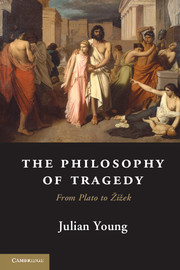Book contents
7 - Hegel
Published online by Cambridge University Press: 05 June 2013
Summary
G. F. W. Hegel (1770–1831) was a genius, as were the two friends with whom he roomed during their student days in Tübingen, Friedrich Hölderlin and Friedrich Schelling. He is, however, the most horrible writer in the history of nineteenth-century German prose (with the possible exception of Fichte). Because of the influence of his profound and synoptic intellect, nearly all of his nineteenth- and twentieth-century successors, both German and French, have laboured under the delusion that one cannot write authentic philosophy unless one tortures the language in which it is expressed to the verge of unintelligibility. Clarity, they fear, is superficiality. Fortunately, however, Hegel’s principal discussion of tragedy occurs in his Aesthetics lectures (A), which reached publication only via the clarifying prose of his student Heinrich Gustav Hotho.
Hegel’s account of tragedy is the most impressive since Aristotle’s and has proved to be, in terms of influence on philosophers of tragedy, perhaps even more powerful. It is focused very largely on Greek tragedy, which, as we shall see, he regards as superior to modern. Above all, it is focused on Sophocles’ Antigone, which he claims to be ‘of all the masterpieces of the classical and modern world … the most magnificent and satisfying’ (A II, p. 1218). Unlike theorists such as Hume, whose interest is confined to the audience’s response to tragedy, Hegel’s primary focus is on its internal structure, though, as we shall see, he by no means ignores the question of its effect on the audience.
- Type
- Chapter
- Information
- The Philosophy of TragedyFrom Plato to Žižek, pp. 110 - 138Publisher: Cambridge University PressPrint publication year: 2013



